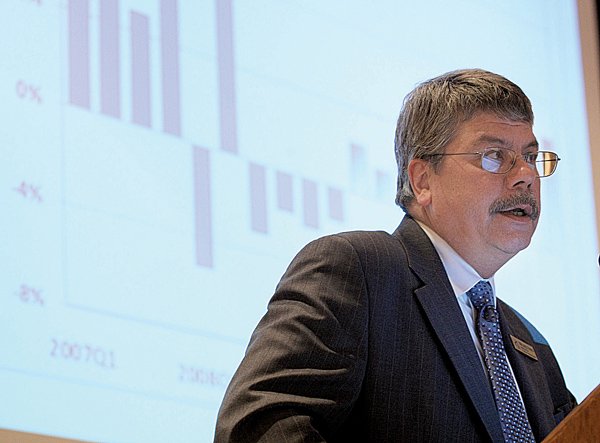LITTLE ROCK — The economic recession will set the Arkansas economy back four years by some major measures, said Michael Pakko, the state’s economic forecaster.
At the University of Arkansas at Little Rock’s release of its annual outlook for the Arkansas economy, Pakko said he expects the statenot to return to 2007 levels of employment, income and home sales until sometime in 2011.
“We’re on an upward trajectory, but it’s going to take some time to see recovery to the level we were at, say, two years ago,” said Pakko, chief economist at the Institute for Economic Advancement at UALR.
Unemployment will beginto fall in the first quarter of 2010, but slower than it rose this year, Pakko said. Pakko expects state unemployment not to rise above 8 percent and to drop to 6.5 percent by 2011.
Joblessness claims in Arkansas have risen nearly 2 percentage points since September 2008. Nationwide, unemployment has risenover 3.5 percent in the same period. Arkansas’ rate was 7.1 in September and the nation’s was 9.8 percent.
One reason for the lower unemployment in Arkansas is that the state is “exploiting the industries that are growing the most nationwide” as the economy develops, Pakko said. He pointed to the increasing share of the state’s labor force in industries such as health care and education as a factor in the state’s “relative stability.”
Arkansas’ gross state product will turn around more quickly, Pakko said. He anticipates a 1.6 percent contraction this year, but expects the gross state product to be positive again in 2010.
“It’s an isolated event, one year’s worth of contraction,” Pakko said. He also said the state’s housing market is “pretty encouraging,” and forecast that prices of existing homes and building permits for new homes would rise next year.
Pakko said that Northwest Arkansas experienced a boom and bust in housing prices. Banks around the state that made loans in the area have had losses, said Julie Stackhouse, a senior vice presidentand managing officer of bank supervision and regulation at the Federal Reserve Bank of St. Louis who spoke later.
“On a relative basis, Arkansas has fared well,” Stackhouse said, speaking about the health of the state’s banking system. “Northwest Arkansas has been extremely difficult. Banks, regardless of where they’re headquartered, made many loans in Northwest Arkansas, and those are still being worked through.”
Stackhouse said that loans made on shopping centers, office buildings and hotels could be the next “shoe to drop” in the economy, as the effects of the recession and lower spending start to affect these projects. Stackhouse said that defaults among commercial real estate loans could be particularly damaging for community banks, who made the majority of those loans.
Stackhouse said that the outlook for potentially risky commercial real estate loans at Arkansas banks, while “not perfect,” is better than banks across the country, though banks in Arkansas hold similar numbers to banks nationwide of those loans.
“It’s not good, but it’s not at all as negative as what we see across most of the country,” she said.
Business, Pages 27 on 10/30/2009
